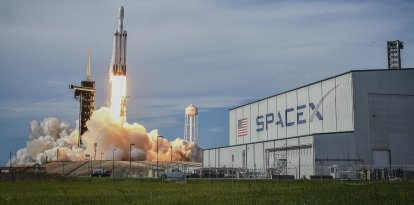AI's gigantic energy consumption to double by 2030
Big Tech is exploring alternative models to power its energy needs, with miniature nuclear reactors among the options.

Servers in the data center of French company OVHcloud in northern France.
The development and use of artificial intelligence (AI) will require increasing amounts of energy. This week, the International Energy Agency (IEA) issued a series of warnings and estimates, predicting a doubling of energy consumption by text and image generators like ChatGPT and Deepseek.
The agency estimates that, between now and 2030, artificial intelligence companies will double their energy consumption for data centers, which are crucial for generating AI responses and content.
In 2024, data centers accounted for approximately 1.5% of global electricity consumption (415 terawatt-hours), but their growth is exponential.
"Electricity demand from data centers worldwide is expected to more than double between now and 2030 to reach about 945 terawatt-hours (TWh)," or just under 3% of total global electricity consumption by that date, and "slightly more than the current total electricity consumption in Japan," states the report released this week by the agency.
The United States, Europe and China currently account for about 85% of data center consumption.
In the United States alone, "data centers are on track to account for almost half" of this projected growth by 2030, emphasizes IEA Executive Director Fatih Birol, as quoted by AFP.
The IEA estimates that "a wide variety of energy sources will be used to meet the growing electricity needs of data centers," including coal, which currently supplies 30% of the electricity for these facilities.
"But renewables and natural gas should assert themselves ahead due to their cost competitiveness and availability in key markets," the IEA notes.
ChatGPT consumption
However, the power consumption of this engine came under public scrutiny after the release of Deepseek, its Chinese competitor that promised a much more energy-efficient model.
Sam Altman, CEO of OpenAI, has publicly stated that the growth of AI will require an energy revolution. Altman himself has invested in nuclear fusion energy projects such as Helion Energy, which has several energy supply projects for private plants for the big tech companies.
Some non-OpenAI players have ventured estimates of ChatGPT consumption. These approximations claim that the daily consumption derived from the use of this AI is estimated at 500,000 kWh. This is roughly equivalent to the daily consumption of 17,000 homes in the United States.
The race for data centers will inevitably result in an increase in emissions related to electricity consumption, rising from the current 180 million tons of CO2 to 300 million tons by 2035. This represents a minimal portion (less than 1.5%) of the emissions from the energy sector.
According to the IEA, these additional emissions could be offset by potential savings in other areas, driven by efficiency gains and innovations brought about by AI.
However, the OECD's energy agency remains cautious, noting that "the uptake of AI is not guaranteed and could be offset by rebound effects and increased fossil fuel consumption."
New energy sources for AI and Big Tech
In response to the growing consumption, major tech companies have started investing in alternative energy solutions to secure their long-term power supply.
As reported by the media, Google has signed an agreement with Kairos Power to develop small modular nuclear reactors (SMRs) that will provide constant, carbon-free energy for its future data centers.
Meanwhile, Amazon Web Services has announced a $500 million investment in similar projects in the United States.
Microsoft, which works closely with OpenAI and provides its infrastructure, has also taken similar steps. According to the New York Times, Microsoft has negotiated the reopening and commissioning of a nuclear power plant in Pennsylvania to meet its energy consumption needs.
These initiatives are not isolated. The European Union has launched an action plan with €20 billion allocated for AI growth, which includes an energy roadmap and the construction of sustainable infrastructures. These investments in next-generation nuclear energy, still in the pilot phase, reflect an effort to anticipate the potential energy crisis that could arise from the expansion of AI models.
























